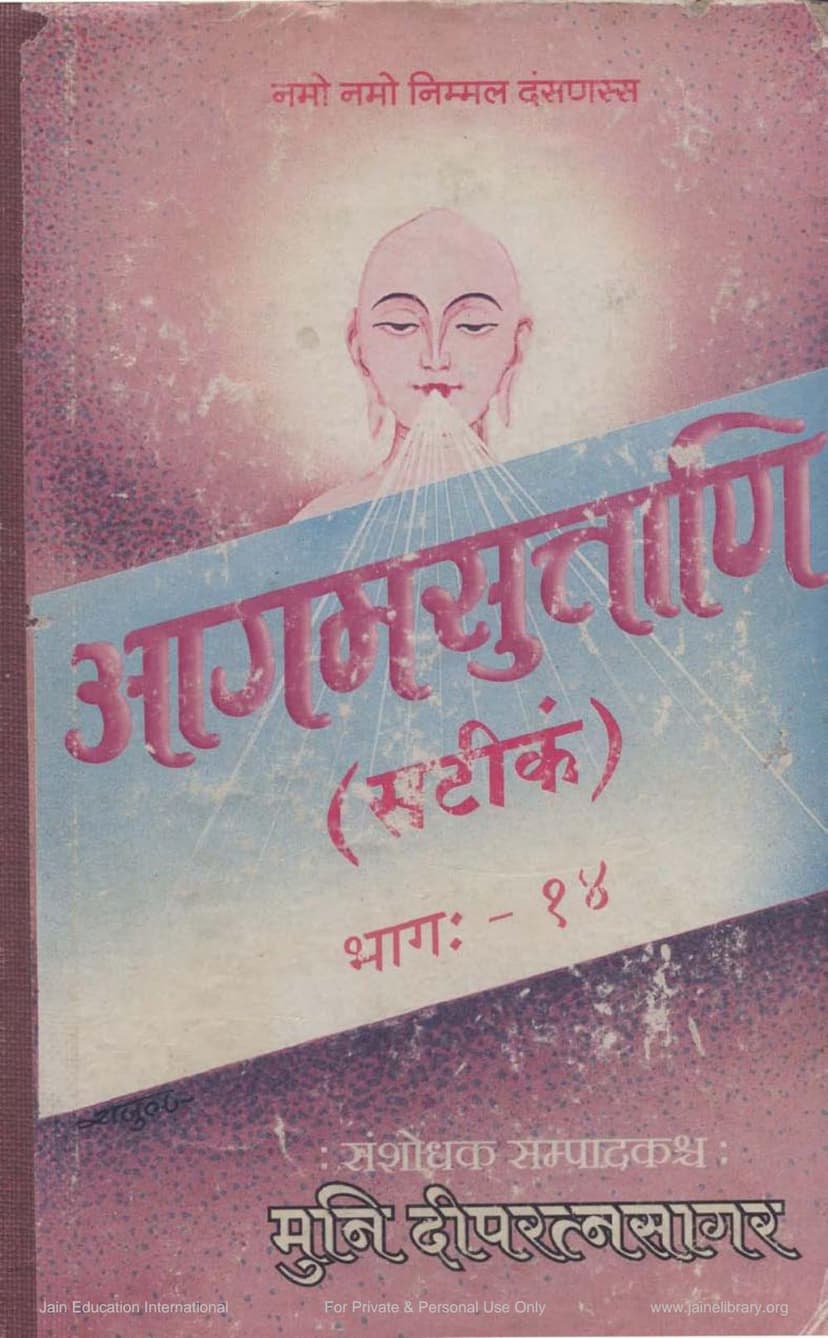Agam Sutra Satik 26 Mahaprtyakhyan PainngSutra 03
Added to library: September 1, 2025

Summary
This document is the 26th Prakirnakasutra (a category of Jain scriptures) titled "Mahapratyakhyana" (Great Renunciation), which is part of the "Agam Sutra Satik 26 Mahaprtyakhyan PainngSutra 03" compilation by Muni Deepratnasagar. The publisher is Agam Shrut Prakashan.
The text itself is a significant portion of Jain scripture, specifically focusing on the principles and practice of great renunciation, a core tenet of Jainism.
Here's a breakdown of the content based on the provided pages:
Key Sections and Themes:
- Title and Attributions: The book is presented as part of "Agam Suvani" (Voice of the Agamas), Volume 14. It acknowledges Muni Deepratnasagar as the compiler and editor. There are salutations to the Tirthankaras, Jinanas (Jinas), Siddhas, and the lineage of gurus.
- Contents Overview: Page 3 to page 24 provide a detailed table of contents for Volume 14 of "Agam Suttani (Satik)," which includes several Upanga Sutras (Nirayavalika, Kalpavataṅsikā, Puṣpikā, Puṣpacūlikā, Vr̥ṣṇidaśā) and Ten Prakirṇaka Sutras. The Mahāpratyākhyāna Prakirṇaka Sutra is listed as item number 26.
- Mahapratyakhyana Sutra (The Core Text):
- Structure: The bulk of the provided text (Pages 8-24) is the "Mahapratyakhyana Prakirṇaka Sutra" itself, presented in its original Prakrit/Apabhramsa (likely) with a Sanskrit commentary/translation (Chāyā). It is structured in verses (Mū. followed by a number, e.g., Mū. (1)).
- Themes and Content: The sutra elaborates on the concept of "Mahapratyakhyana," which translates to "Great Renunciation" or "Great Vow of Renunciation." This involves:
- Taking Refuge and Accepting Vows: Expressing devotion to Tirthankaras, Jinanas, and Siddhas, and accepting the path prescribed by the Jinanas.
- Renunciation of Actions and Attachments: Declaring renunciation of all sinful actions, material possessions, bodily comforts, food, and sensory pleasures. This includes renouncing anger, pride, deceit, greed, attachment, aversion, fear, sorrow, and other negative emotions.
- Self-Reflection and Repentance: Practicing self-criticism (nindā, garhā), confession (ālocanā), and seeking forgiveness.
- The Nature of the Self: Emphasizing the eternal and pure nature of the soul (Ātmā) and the transient nature of external attachments.
- The Path of the Soul: The sutra describes the soul as the true refuge and discusses the importance of knowing oneself (āyā me jnāne āyā me darśane charite ya).
- Ethical Conduct: Adherence to vows, restraint of senses, and the importance of right knowledge, right faith, and right conduct.
- The Consequences of Actions: Discussing the cycle of birth, death, and suffering caused by karmas and attachments.
- The Ideal Death (Pandita Marana): The text repeatedly emphasizes the ideal death, known as Pandita Marana (wise death), which is achieved through deep spiritual practice, renunciation, and equanimity. It contrasts this with ordinary or ignorant deaths.
- Overcoming Obstacles: It speaks about overcoming internal "salya" (thorns or impurities) like false beliefs, attachment, and desires for future gains.
- The Role of the Guru: The importance of confessing one's faults to a Guru and following their guidance for atonement (prayaschitta).
- The Power of Renunciation: The sutra highlights how sincere renunciation leads to purity, liberation, and the ultimate goal of Nirvana.
- Examples and Metaphors: The text uses metaphors like fire consuming wood, or the sea being filled with water, to illustrate the insatiable nature of desires and the transformative power of spiritual practice.
- Supporting Information:
- Publisher Details: Contact information for "Agam Shrut Prakashan" is provided.
- Donors: A section lists various individuals and organizations that have financially supported the publication of this book, indicating its community backing.
- Index of Agamas: Page 25-41 provide a detailed index of the 45 Agamas, their commentaries, the number of verses, and their division into Angas, Upangas, Prakirnakas, and Chulikas. This section is crucial for understanding the context and scope of Jain scriptural literature.
- Verse Counts and Catalog: The document includes tables listing the number of verses for various Agamas and their commentaries.
- Table of Contents for Volume 14: This section meticulously lists all the scriptures included in this particular volume, including their respective page numbers and divisions.
In essence, the "Mahapratyakhyana Prakirṇaka Sutra" within this volume is a profound discourse on the practice of complete renunciation, detachment from worldly pleasures and possessions, self-purification through confession and repentance, and the ultimate attainment of liberation (Moksha) through a virtuous and spiritually dedicated life, culminating in a peaceful and wise death. It serves as a guide for ascetics and laypeople seeking spiritual advancement in Jainism.